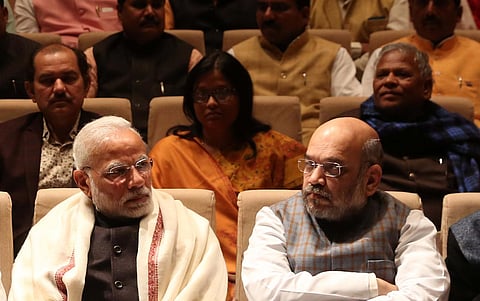Modi may end up benefiting from incumbency in 2024 elections: Morgan Stanley
For the longest time, anti-incumbency has proven to be a crucial factor in Indian elections and the ruling party is always assumed to be at a disadvantage. But Morgan Stanley, the US-based financial services conglomerate, follows a different line in its latest analysis on India’s upcoming general elections.
The analysis talks about the 'Force of Incumbency index' that states that election results, for its large part, are led by the nation's growth or more precisely, the prosperity cycle. This means that increase in GDP augments the incumbent governments, whether at central or state level.
The Force of Incumbency index is measured using the results of every single state and general election since 2002.
Significant factors
According to Morgan Stanley’s research, the three factors that will affect election outcomes disproportionately are - stock market investors, social media users and first time voters.
These groups may not have been significant years ago, but they are today because of their larger size and superior access to information, said the group.
For example, the number of equity investors has grown in the last five years. There are currently 100-120 million voters who are stock market investors, it pointed out. Similarly, more than 500 million Indians, almost half of India’s voters are on social media platforms, among which 130 million will be first time voters.
“The stock market cohort, which has amassed significant wealth over the past five years, however, will vote in favor of continuity in administration as it is more likely to ensure stock market stability. Nevertheless, only so much can be commented due to the heterogeneity in these groups in terms of income, wealth or social progress,” quoted the report.
Meanwhile, farmers remain the largest voting bloc. Morgan Stanley pointed out that there has been a significant drop in the number of farmer suicides -- declining from 17,000 in 2015 to less than 11,000 in 2021.
Apart from this, religious and caste groups have historically played an important role in elections, it pointed out.
However, pointed out the broker, there is only limited information to predict how these groups will behave in the forthcoming elections, it added.
Improving living conditions
Other factors that influence people's decisions to vote for a certain party are level of poverty, farmer suicides, terms of trade for rural India, female foeticide, infant mortality and transfers from the government, and here, the falling levels of female foeticide and sharp drop in infant mortality show a sign of social progress.
Poverty is measured using the Multidimensional poverty index which assesses health, education and standard of living of people. According to UNDP data, these factors have shown significant improvement over the past years.
Health: The percentage of people who were malnourished reduced from 21.05 in 2015-16 to 11.80 in 2019-21. The child mortality has reduced from 2.22 to 1.48 for the same period.
Education: The number of children deprived of schooling has reduced from 11.62 in 2015-16 to 7.72 in 2019-2021.
Standard of living: The percentage of people deprived of cooking fuel (13.90), sanitation (11.29), drinking water (2.66), electricity (2.08), housing (13.61) and assets (5.60) have significantly reduced by 2019-2021.
Geography of elections
The report also delved into geographical trends that will mould the elections.
It pointed out that Uttar Pradesh and Maharashtra are likely to play crucial roles in the 2024 election outcome. This is because they are the largest contributors to the Lower House, with 128 seats, nearly a quarter of the total 543 elected representatives.
The pre-poll alliances in these states could polarize results as these have fragmented politics with the presence of regional parties. The current Lok Sabha holds 85 seats or about 30% of its total count in the Lower house from these two states alone, it noted.
Another state that is likely to play a crucial role in the 2024 elections is Tamil Nadu, especially with BJP's poor presence in the last elections in the state.
Bihar is another state with fragmented polity where pre-poll alliances could make a difference, while West Bengal is likely to see a straight battle between BJP and the All India Trinamool Congress, the report said.
INC and BJP have together won at least 50% of the seats in the past ten elections. This highlights the significance of alliances in political parties.
The 26-party alliance I.N.D.I.A is a significant development in this context. The key to this alliance’s success will be its ability to share seats aptly ahead of the elections, comments the report.
Five state elections are taking place in the coming months in Mizoram, Telangana, Rajasthan, Madhya Pradesh and Chattisgarh respectively. The polarization in these state election results could influence market sentiment in the journey to the 2024 Lok Sabha election date.
But Morgan Stanley research does not adopt state election results as a promising guide to predict general elections as past elections show contradictory evidence. In the year 2018, for example, BJP did not perform well in the above-mentioned state elections but eventually won a majority in general elections. However, the opposite happened in 2003.

